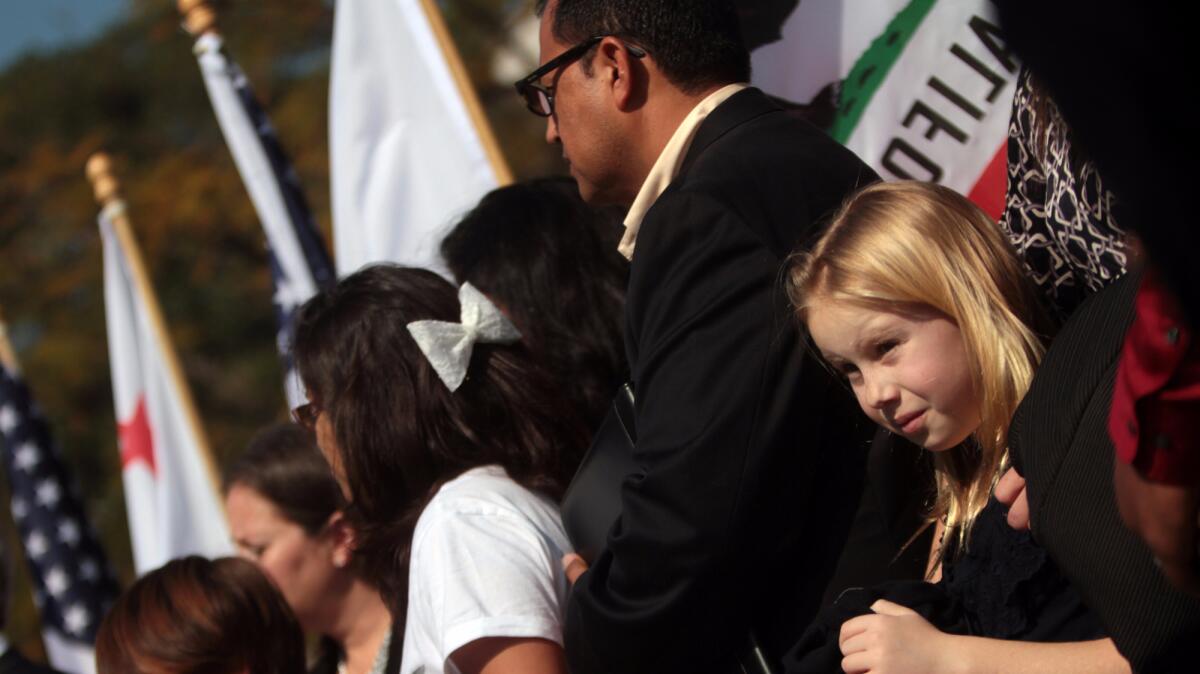Court refuses to mandate use of test scores in teacher evaluations

A judge in Northern California dealt a blow this week to a controversial campaign to make teachers more accountable for their studentsâ level of achievement, the second key setback in recent months for those behind the effort.
The ruling by Contra Costa County Superior Court Judge Barry Goode went against the Bay Area group Students Matter. The groupâs lawsuit aimed to force 13 school districts, including seven in Southern California, to make student standardized test scores a key part of teacher evaluations.
For the record:
3:40 p.m. Sept. 22, 2016An earlier version of this article said that the Supreme Court declined to hear the Vergara teacher-tenure case in April. The court made its announcement in August.
Students Matter had hoped to build on a 2012 ruling against the Los Angeles Unified School District, which led to a settlement under which test scores were supposed to become part of teacher evaluations.
But in Doe vs. Antioch, the case decided this week, the judge concluded that districts had broad discretion over how to use test results. The school districts in question, including Inglewood Unified, El Monte City, and Saddleback Valley Unified, were meeting their legal obligations, he said.
âThe Legislature endorses many uses of those tests, including evaluating pupils, entire schools and local educational agencies,â Goode wrote in an opinion released Monday. âBut it does not say the results should be used to evaluate individual teachers.â
This weekâs ruling follows the California Supreme Courtâs August decision not to re-examine a ruling that preserved traditional teacher job protections, including tenure and seniority-based layoffs. In that nationally watched case, Vergara vs. California, Students Matter argued that these job protections are unconstitutional because, by protecting ineffective teachers, they deprive students, especially poor and minority ones, of their right to an education.
The Antioch decision surprised Marcellus McRae, who represented the plaintiffs, six California residents including parents and teachers.
âIf you really think about it, this is such a basic concept that the goal of teaching is for students to learn,â said McRae. âIt is, to me, axiomatic that teacher evaluations have to be based at least in part over whether students have learned.â
âWhat other profession is there where people do not get evaluated on results as opposed to their efforts only?â McRae added. âHow is that, in California school districts, 98% of teachers get satisfactory ratings, but only 44% of students meet the English Language Arts literacy standards? And only 34% met the standards in math?â he said, referring to 2014-15 numbers. (Performance improved somewhat in the tests taken during the last school year.)
Teachers unions argue that judging teachers by test scores overlooks the effects of poverty and other external factors on student achievement. They also challenged the focus on test scores as a uniquely important measure of student progress.
âEvery day teachers across California use a variety of benchmarks, including in-class quizzes, tests, projects, and personal observation to fine-tune their approaches with their students,â said Joshua Pechthalt, president of the California Federation of Teachers. âThere is no single method for assessing progress that is ideal or that should be used to the exclusion of all others.â
Students Matter, which focuses on âimpact litigation,â also is pursuing a lawsuit in Connecticut that aims, among other things, to make it easier to open charter schools. The group is funded by philanthropists with an agenda that broadly includes greater reliance on test scores, weakening teachers unions and spurring the growth of charter schools. Allied groups have active Vergara-like cases in New York and Minnesota.
A fundamental goal of their strategy is to use the courts to bypass state legislatures in which teacher unions exert powerful influence.
Initially, the Antioch litigation seemed like low-hanging fruit. If L.A. Unified, the nationâs second-largest school system, could be brought to heel, what hope of resistance was there for Antioch Unified, a district of 18,000 students about 35 miles east of Berkeley? Perhaps fearing the worst, nine of the districts revised their evaluation processes after the suit was filed, McRae said.
Both the L.A. and Contra Costa cases were based on language from the the Stull Act, which the Legislature passed in 1971 and amended several times since. It requires school districts to âevaluate and assessâ teachers in a manner that âreasonably relatesâ to the progress of pupils toward established standards and, âif applicable,â to state learning goals as measured by standardized tests.
The judge found wiggle room.
âThere are serious questions about whether, and the extent to which, a pupilâs standardized test score is âreasonably relatedâ and âapplicableâ to the performance of a given teacher,â Goode wrote.
Even in L.A., an evaluation process that relied directly on test scores never went into effect, Goode noted in his opinion.
Students Matter is weighing whether to appeal.
Twitter: @howardblume
To read the article in Spanish, click here
MORE EDUCATION NEWS
Cal State wants to double its graduation rate by 2025
UC campuses scramble to make room for thousands more new California students
For the first time, California releases test scores for foster youth â and theyâre not good
More to Read
Sign up for Essential California
The most important California stories and recommendations in your inbox every morning.
You may occasionally receive promotional content from the Los Angeles Times.











